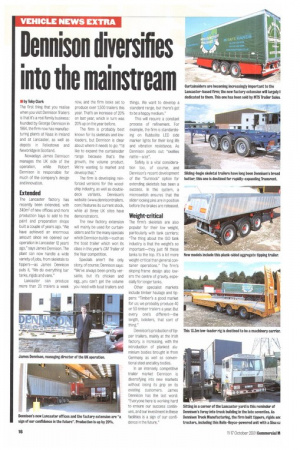Dennison diversifies into the mainstream
Page 16

If you've noticed an error in this article please click here to report it so we can fix it.
• by Toby Clark The first thing that you realise when you visit Dennison Trailers is that it's a real family business: founded by George Dennison in 1964, the firm now has manufacturing plants at Naas in Ireland and at Lancaster, as well as depots in Felixstowe and Newbridge in Scotland.
Nowadays James Dennison manages the UK side of the operation, while Robert Dennison is responsible for much of the company's design and innovation.
Extended I he Lancaster factory has recently been extended, with 340m2 of new offices and more production bays to add to the paint and preparation shops built a couple of years ago. "We have achieved an enormous amount since we opened our operation in Lancaster 12 years ago," says James Dennison. The plant can now handle a wide variety of jobs, from skeletals to tippers—as James Dennison puts it, "We do everything bar tanks, rigids and vans.'
Lancaster can produce more than 25 trailers a week now, and the firm looks set to produce over 1,500 trailers this year. That's an increase of 20% on last year, which in turn was 20% up on the year before.
The firm is probably best known for its skeletals and lowloaders, but Dennison is clear about where it needs to go: "I'd like to expand the curtainsider range because that's the growth, the volume product. We're wanting to market and develop that."
The firm is developing reinforced versions for the woodchip industry, as well as doubledeck variants. Dennison's website (www.dennisontrailers. corn) features its current stock, while all three UK sites have demonstrators.
The new factory extension will mainly be used for curtainsiders and for the many specials which Dennison builds—such as the boat trailer which won its class in this year's CM Trailer of the Year competition.
Specials aren't the only story, of course; Dennison says: "We've always been pretty versatile, but Ts chicken and egg...you can't get the volume you need with boat trailers and things. We want to develop a standard range, but there's got to be a happy medium," This will require a constant process of refinement. For example, the firm is standardising on Rubbolite LED side marker lights for their long life and vibration resistance. As Dennison points out: "skellies rattle—a lot".
Safety is a vital consideration too, of course, and Dennison's recent development of the "Surelock" option for extending skeletals has been a success. In this system, a microswitch ensures that the slider locking pins are in position before the brakes are released.
Weight-critical
The firm's skeletals are also popular for their low weight, particularly with tank carriers: "The thing about the ISO tank industry is that the weight's so important—they just fill these tanks to the top. It's a lot more weight-critical than general container operations." The firm's sloping-frame design also lowers the centre of gravity, especially for longer tanks.
Other specialist markets include timber haulage and tippers: "Timber's a good market for us; we probably produce 40 or 50 timber trailers a year. Eke every one's different—the length, bolsters, that sort cif. thing."
Dennison's production of tipper trailers, mainly at the Irish factory, is increasing, with the introduction of planked aluminium bodies brought in from Germany as well as conventional steel and alloy bodies.
In an intensely competitive trailer market Dennison is diversifying into new markets without losing its grip on its existing customers. James Dennison has the last word: "Everyone here is working hard to ensure our success continues, and our investment in these facilities is a sign of our confidence in the future."








































































































































